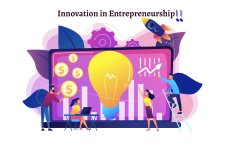Innovation isn’t just a buzzword tossed around in pitch decks and boardrooms. For entrepreneurs, it’s the heartbeat of survival, growth, and disruption. In a world where everything changes with a swipe, click, or tap, standing still is the fastest way to fall behind.
Entrepreneurship without innovation? That’s just copying. And copying won’t get you far in a world that rewards originality. So, if you're building something new, you’re not just starting a business—you’re rewriting a rulebook.
Every iconic venture started with a rebellious “What if?”
True innovation doesn’t always come from shiny tech. It comes from perspective.
It’s the ability to see problems as possibilities. It’s spotting inefficiencies others accept and saying, “Let’s fix this.” Entrepreneurs who innovate often operate like artists—messy, intuitive, and brave.
Think like:
Innovation and failure are siblings. The path to groundbreaking ideas is littered with broken ones. But that's okay—failures are prototypes for breakthroughs.
Entrepreneurs who innovate well:
The beauty of innovation is its ripple effect. A single idea can:
Innovation in entrepreneurship isn’t a luxury—it’s a responsibility. Because today's ideas shape tomorrow’s world. So if you're an entrepreneur, be bold. Ask “what if?” Break the rules. Reimagine the experience. Design solutions no one asked for but everyone needs.
Your innovation might just be the spark the world didn’t know it was waiting for.
Entrepreneurship without innovation? That’s just copying. And copying won’t get you far in a world that rewards originality. So, if you're building something new, you’re not just starting a business—you’re rewriting a rulebook.
 Innovation Begins with Asking “What If?”
Innovation Begins with Asking “What If?”
Every iconic venture started with a rebellious “What if?”- What if taxis could be summoned from your phone? (Hello, Uber)
- What if we could rent strangers' homes while on vacation? (Thank you, Airbnb)
- What if students could learn from anywhere, anytime? (Enter, edtech revolution)
 Mindset Over Machinery
Mindset Over Machinery
True innovation doesn’t always come from shiny tech. It comes from perspective.It’s the ability to see problems as possibilities. It’s spotting inefficiencies others accept and saying, “Let’s fix this.” Entrepreneurs who innovate often operate like artists—messy, intuitive, and brave.
Think like:
- The café owner who turns her local shop into a co-working space

- The farmer who uses drones to track crop health

- The online seller who uses AI to predict customer needs

 Failing Fast, Learning Faster
Failing Fast, Learning Faster
Innovation and failure are siblings. The path to groundbreaking ideas is littered with broken ones. But that's okay—failures are prototypes for breakthroughs.Entrepreneurs who innovate well:
- Test fast
- Listen carefully
- Pivot confidently
- Never fall in love with their first draft
 The Ripple Effect: Innovation Isn’t Just for You
The Ripple Effect: Innovation Isn’t Just for You
The beauty of innovation is its ripple effect. A single idea can:
- Spark an entire industry
- Transform communities
- Influence global habits
- Solve real-world issues
Final Thought: The World Needs More Rebels with Ideas
Innovation in entrepreneurship isn’t a luxury—it’s a responsibility. Because today's ideas shape tomorrow’s world. So if you're an entrepreneur, be bold. Ask “what if?” Break the rules. Reimagine the experience. Design solutions no one asked for but everyone needs.
Your innovation might just be the spark the world didn’t know it was waiting for.

